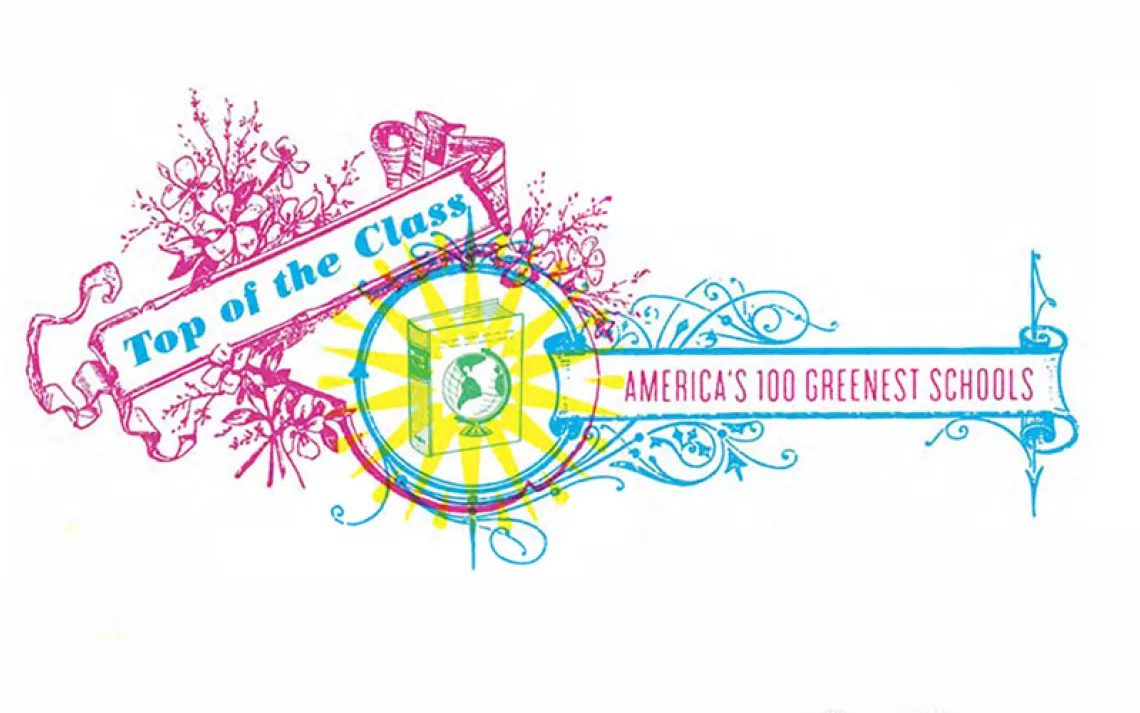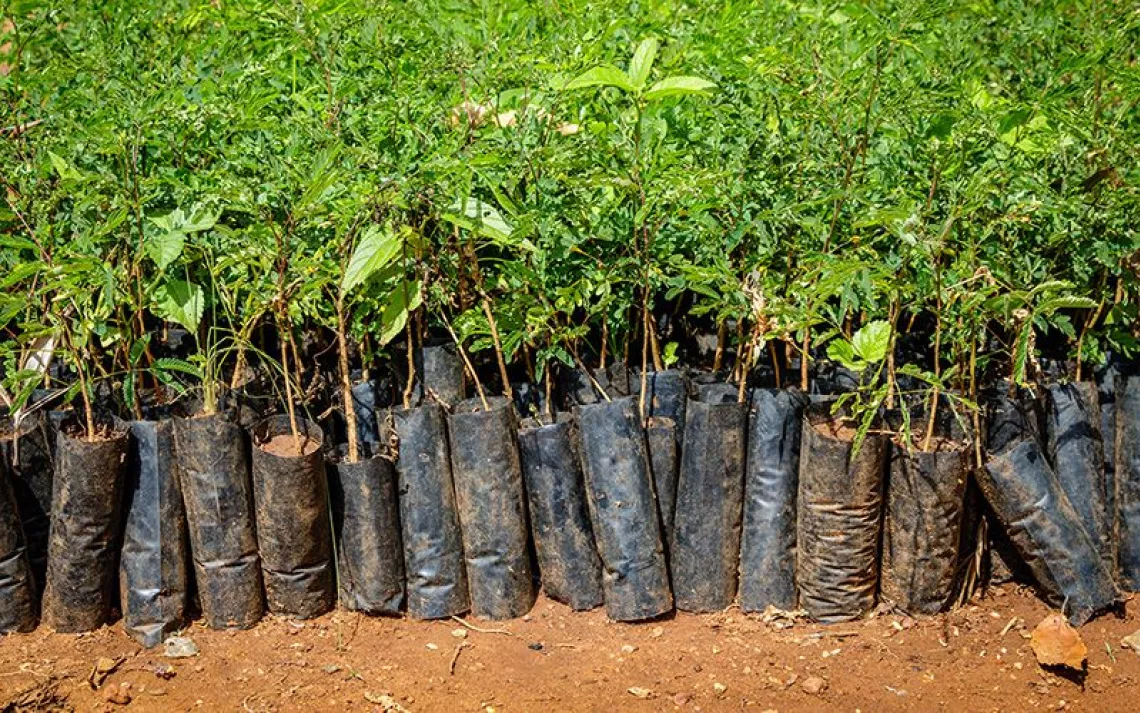College Rankings: For Bikes
How two students earned their college official “bike-friendliness” designation

Professor Margot Higgins and her Macalester College students Ellie Hohulin '19 and Marlee Yost-Wolff '19 with their Bicycle Friendly University award. | Photo by Ann Esson and courtesy of Macalester College
Whether your college has bike lanes, a bike library, bicycle education classes, and/or a public bike repair station can determine whether cruising through campus on two wheels is a dream or a nightmare. Since 2011, the League of American Bicyclists, one of the oldest and largest bicycle advocacy and education membership organizations in the United States, has recognized those schools that make it easy for students and staff to get on their bikes and reduce emissions as certified Bicycle Friendly Universities (BFU). It’s a tiered designation system designed to honor those colleges embodying the five E’s of bike infrastructure: engineering, encouragement, education, enforcement, and evaluation/planning.
Here’s how it works: A school submits a comprehensive application to the Bike League, and then a judging panel determines its bike-friendliness factor and if applicable, award level (platinum, gold, silver, or bronze). It comes as little surprise that a school like University of California-Davis, home of the U.S. Bicycling Hall of Fame and located within the self-proclaimed Bike Capital of America, has fetched the coveted Platinum status, making it one among only five (Colorado State University, Portland State University, Stanford University, and the University of Minnesota, Twin Cities) top-tiered schools.
This illustrious award is most within reach of midsize to large schools, which tend to have the staff and funding in place to prioritize bike infrastructure. This year, Macalester College in St. Paul, Minnesota, became one of the few liberal arts colleges to achieve Silver status—a notable improvement from its first bid in 2011, when it received only an honorable mention. But this time, it wasn’t a staff member who completed the 30-page application—it was all thanks to the arduous work of two undergraduate students, Ellie Hohulin and Marlee Yost-Wolff.
The two were winter 2016 classmates in “Bicycling the Urban Landscape,” a course taught by visiting environmental social scientist and historian Margot Higgins. The course title describes much of what the students actually did: partake in a number of bicycling field trips to get acquainted with Twin Cities bike infrastructure, and engage in local bike policy by writing op-eds and meeting with transportation planners. Yost-Wolff had never before biked in an urban area, and had to borrow a bike from a friend for class. The trips she took on it proved transformative. “I learned a lot about myself and my surroundings—my body, my school, my city—from biking,” she says. As Yost-Wolff started to pay attention to the ways she passed through the environment, she also took note of the emotional impact of traveling on two wheels. “To me, biking feels like seeing and acknowledging one’s neighbor’s experience as human,” she says. “It makes me feel strong and powerful and proud while also pretty vulnerable, and at times, scared.”
For the mid-term, Hohulin and Yost-Wolff used their newfound knowledge to investigate bike infrastructure and policy on their own campus, taking note of bike traffic and bike rack use. Afterward, “having enjoyed the course so much,” Hohulin says she and Yost-Wolff were inspired to continue to engage with the bike community through the BFU application. Professor Higgins remained their guide as the two “very exceptional students” sought to tackle the 70-question application, embarking on an independent study that lasted into the summer.
The pair quickly realized they could boost their chances of gaining BFU recognition by starting various programs on campus. They started by raising $3,000 (which was matched by Macalester’s High Winds Fund) to install a Dero ZAP bicycle counter on campus. It’s an automated bicycle commuting recognition system that logs bike trips to campus, rewarding bicycle commuters with prizes. They also instituted the first “Bike to Mac” day—appropriately held on Earth Day—and provided free coffee and donuts to participating faculty and students.
But then, Hohulin and Yost-Wolff ran into an unanticipated challenge: they starting hearing from friends that international students, who comprise about 20 percent of the student body, were learning to bike “at obscene hours in the morning—2 or 3 a.m.—just so other students wouldn’t witness them fall,” Hohulin says. To tackle this “I-don’t-know-how-to-bike” stigma, they decided to enact a special bike education session. Take note of the fact that Hohulin and Yost-Wolff did this all in one semester—a herculean feat that included assembling data from Macalester’s Facilities Services, Sustainability Office, Environmental Studies Department, and Alternative Transportation Association—so as to provide an accurate assessment of bike infrastructure on campus.
Their hard work paid off. The Bicycle Friendly University Silver award is now mounted prominently outside the Campus Center, where hundreds among Macalester’s 2,000+ students see it daily. This goes to show, Professor Higgins says, that “students can really play a role in reshaping transportation policies wherever they go to school.” Hohulin notes that the application process helped her “uncover more about what is important for a campus and community in terms of bike friendliness,” and highly recommends the experience for other interested students. No matter the result, it’s a worthwhile endeavor—the Bike League issues each applicant a feedback report listing ideas for how to improve.
Up next for Hohulin and Yost-Wolff? Persuading the campus to end free parking for faculty and students, and creating an updated bike master plan. The latter, they say, may be easier than the former.
 The Magazine of The Sierra Club
The Magazine of The Sierra Club



